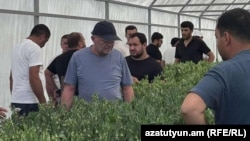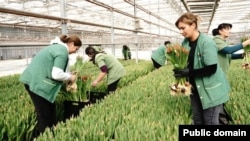They said that due to the restrictions imposed late last month flowers grown by them are no longer shipped to Russia, their principal market.
The Russian agricultural watchdog Rosselkhoznadzor first threatened to ban the rapidly growing Armenian flower imports on June 3. It said laboratory tests conducted by it have found an alarming increase in harmful “quarantined organisms.” Armenia’s Food Safety Inspectorate scrambled to address the Russian concerns but clearly failed to satisfy Rosselkhoznadzor.
“Despite the agreements reached on strengthening phytosanitary control by the Armenian side, the import of infected flowers of unknown origin into Russia was prevented in 20 cases in 2025,” the Russian government agency said in a June 25 statement.
This testifies to the “inability of the Armenian side to ensure phytosanitary safety and traceability of flower products sent to Russia,” it said, adding that some of those flowers are grown in third countries and do not conform to the Eurasian Economic Union’s sanitary norms. The statement went on to announce that starting from June 27 only those Armenian exporters that can prove the origin of their flowers will be allowed to sell them in the vast Russian market.
The measure appears to have largely halted Armenian flower exports to Russia that reportedly reached $32 million last year. It has hit particularly hard the kind of small-scale farmers that staged Friday’s protest in Armavir.
“Exporters would come to the market, buy our flowers and take them away,” one of them told RFE/RL’s Armenian Service. “But not this year. There is no such thing this year.”
“I don’t know what I’m going to do with my 60,000 flowers that are about to blossom,” said another farmer. “Now that the time has come to export our flowers the roads are blocked [by Russia].”
The protesters warned that they will block a highway to Yerevan unless the government clarifies by Monday what it is doing about the Russian ban and when it could be lifted.
The Food Safety Inspectorate spokeswoman, Anush Harutiunian, said in this regard that her agency has been working closely with the Russians and that they have already allowed seven Armenian firms to resume their flower exports.
“Also, Rosselkhoznadzor specialists will soon visit Armenia, familiarize themselves with our greenhouses and see that our produce is not that bad,” she told RFE/RL’s Armenian Service
Rosselkhoznadzor did not confirm the upcoming visit in another statement on Armenia released on Friday. The Russian watchdog announced instead that “at the request of the Armenian side” its deputy chief, Yulia Shvabauskene, and the head of the Armenian inspectorate, Tigran Petrosian, will negotiate via video link on July 14.
Russia is also the main market for other agricultural products as well as alcoholic beverages exported by Armenia. In the last few years, Moscow has occasionally and briefly banned some of those exports on similar sanitary grounds construed by Armenian commentators as Russian retaliation against the Armenian government’s continuing drift to the West.
Russian-Armenian tensions were reignited late last month by Prime Minister Nikol Pashinian’s ongoing campaign against the Armenian Apostolic Church that led to the arrests of two archbishops and Russian-Armenian billionaire Samvel Karapetian. Russian Foreign Minister Sergei Lavrov criticized the “unjustified attacks” on the church on June 30. His Armenian counterpart Ararat Mirzoyan responded by accusing Moscow of meddling in Armenia’s internal affairs.
Last week, the Armenian Foreign Ministry summoned Russia’s ambassador in Yerevan, Sergei Kopyrkin, to again protest against “hostile” statements by Russian lawmakers and media. The Armenian ambassador in Moscow, Gurgen Arsenian, was in turn summoned to a meeting with Russia’s Deputy Foreign Minister Mikhail Galuzin on Monday.





